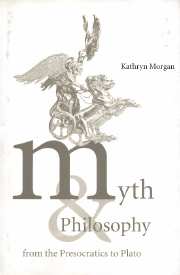Book contents
- Frontmatter
- Contents
- Acknowledgements
- 1 Introduction
- 2 Theoretical issues
- 3 Some Presocratics
- 4 The sophists and their contemporaries
- 5 The Protagoras: Platonic myth in the making
- 6 The range of Platonic myth
- 7 Plato: myth and the soul
- 8 Plato: myth and theory
- 9 Conclusion
- Bibliography
- Index of passages cited
- General index
9 - Conclusion
Published online by Cambridge University Press: 22 September 2009
- Frontmatter
- Contents
- Acknowledgements
- 1 Introduction
- 2 Theoretical issues
- 3 Some Presocratics
- 4 The sophists and their contemporaries
- 5 The Protagoras: Platonic myth in the making
- 6 The range of Platonic myth
- 7 Plato: myth and the soul
- 8 Plato: myth and theory
- 9 Conclusion
- Bibliography
- Index of passages cited
- General index
Summary
Is myth a disease of language? If so, it is one for which language has a genetic weakness. Philosophical myth strives to be the inoculation against the disease, and, as is often the case, infects the patient with a weakened and preventative strain of the illness. By introducing a particular, engineered strain of myth into philosophical discourse, the authors whom I have been considering can both acknowledge and attempt to move beyond the inherent weakness of words. They can appropriate the productions of poetic predecessors and contemporaries and reissue them in their own image, while still guarding themselves against any charge that they repeat poetic mythological mistakes. Once recognised, the fallibility of language becomes a source of opportunity. Parmenides' goddess can, in the second part of his poem, boast of the deceitful ordering created by words, while still expecting her audience to be proof against it. Meanwhile, the errors of mortal thought are mercilessly exposed in the first part, but in such a way that we are forced to question whether the language of the poem can contain the conclusions expressed.
The sophists view myth as a form of literary and cultural convention. By manipulating this convention they can advertise their intellectual expertise and attract pupils. Since the content of their teaching is rhetorical, manipulation is not only a means but an end. Manoeuvring in and through language, they display its detachment from any universal or metaphysical truth.
- Type
- Chapter
- Information
- Myth and Philosophy from the Presocratics to Plato , pp. 290 - 291Publisher: Cambridge University PressPrint publication year: 2000

